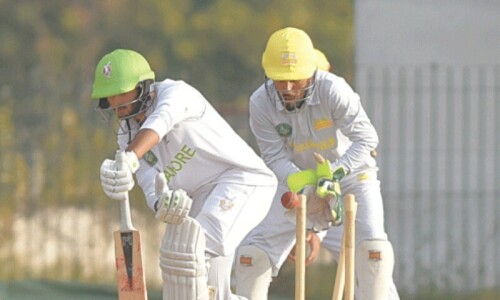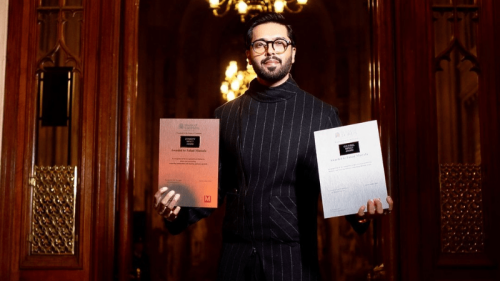NEW DELHI, Dec 1: Sleuths from Israel, the United States and Britain were studying clues from the battle zone of last week’s terror attacks in Mumbai as India mounted pressure on Pakistan on Monday to act against specific suspects New Delhi wants to be extradited.
Pakistan’s High Commissioner Shahid Malik was called to the foreign ministry where he was “informed that the recent terrorist attack on Mumbai was carried out by elements from Pakistan,” an Indian statement said. “Government expects that strong action would be taken against those elements, whosoever they may be, responsible for this outrage.”
The foreign ministry also conveyed to Mr Malik that “Pakistan’s actions needed to match the sentiments expressed by its leadership that it wishes to have a qualitatively new relationship with India.”
The official statement did not say what these actions typically might be, but news reports quoted Indian officials as demanding the extradition of two men, which has been pending for some time.
They are former Mumbai underworld don Dawood Ibrahim and Maulana Masood Azhar, the leader of the banned Pakistani militant group Jaish-i-Mohammed, who was once jailed in India. Both men have been accused of orchestrating previous attacks in India, but neither has been directly implicated in last week’s assault on Mumbai that left close to 200 dead and 239 wounded. It was not clear if the extradition request has international backing.
In any case, the Mumbai carnage has clearly put the spotlight where India likes it: on terror and away from Kashmir. With the Mumbai outrage the Obama administration’s quest to use the resolution of Kashmir to cement India-Pakistan ties in order to fight terrorism more effectively would probably have to wait.
A Pakistani diplomat denied that Mr Malik was “summoned” but said the envoy had good discussions with foreign ministry officials in which the Mumbai attacks and the peace process were discussed. “In fact we can say that Indian officials have been very good with us, which is just the opposite of the way the Indian media has behaved since the Mumbai tragedy.”
In the meantime, the shadow of Mumbai continued to roil the political leadership for the second day. Finance Minister P. Chidambaram was given the home portfolio vacated by Mr Shivraj Patil. Prime Minister Manmohan Singh kept the finance with himself. Maharashtra Home Minister R.R. Patil, in charge of security in Mumbai, resigned Monday. His boss, Maharashtra Chief Minister Vilasrao Deshmukh, also offered to quit.
Meanwhile, taking the terror strikes on a Jewish establishment in Mumbai seriously, Israel’s defence ministry has decided to view the attack on Nariman House or Chabad House as an “enemy action” against the State of Israel. The decision, among other things, will entitle the families of the victims of Nariman House the same financial benefits that are granted to victims of terror attacks in Israel.
At least eight Israelis have been identified among the dead in last week’s terror attacks.
The Jerusalem Post said a seven-member team of Israeli police’s victim identification unit left for India on Sunday to assist in locating and identifying two missing Israelis, who have not reported in yet.
The New York Times said American and Indian intelligence services had used communications intercepts to tie the Pakistan-based militants to the terror strikes. Indian officials may also be gleaning information from at least one captured gunman who participated in the attacks.
Reports said British sleuths are investigating reports that two of the Mumbai attackers were British citizens of Pakistan origin, with Prime Minister Gordon Brown saying that it was too early to tell whether his country’s nationals were involved.
Baqir Sajjad Syed adds from Islamabad: After days of finger pointing, India on Monday formally accused ‘elements from Pakistan’ of involvement in the Mumbai carnage and asked Pakistan to take strict action against them.
In the first diplomatic salvo after the incident, India handed over two demarches to Pakistan -- one was submitted at the Foreign Office in Islamabad by Indian High Commissioner Satyabrata Pal, while the other to Pakistan’s High Commissioner in New Delhi, Shahid Malik, by the Indian external affairs ministry.
A reply was handed over to the Indian high commissioner by Foreign Secretary Salman Bashir in the evening.
Diplomatic sources suggested that the reply was on ‘general lines’.
“During the meeting with the Indian high commissioner, the foreign secretary condemned the attacks, condoled with the families of the victims and people of India, and reiterated the assurances of our cooperation.
“The foreign secretary refuted unsubstantiated allegations by Indian media of Pakistan’s complicity in the Mumbai incident,” the Foreign Office said.
“Similar meetings will continue to be held to exchange views and information on the Mumbai incident,” it added.
The Indian side described the meeting as cordial and one that went well.
Meanwhile, Foreign Minister Shah Mehmood Qureshi told DawnNews that Pakistan was willing to assist India, but wanted the government in Delhi to spell out how it could help.
He said Pakistan was contemplating several initiatives which would be shared with India shortly.















































Dear visitor, the comments section is undergoing an overhaul and will return soon.